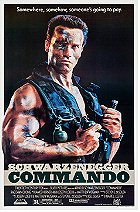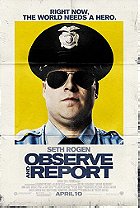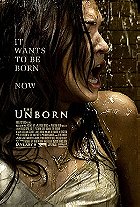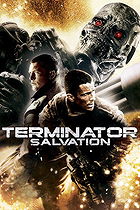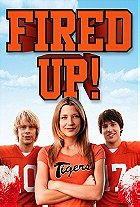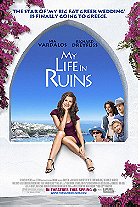Posted : 15 years, 7 months ago on 16 November 2009 12:21
(A review of
"All fucking hell is going to break loose..."
Though I walk through the valley of shadow and death, I shall fear no evil; for Lord John Matrix will protect me; his big fucking guns and huge muscles, they comfort me.
In the beginning, there was the masterpiece known as
Commando. The God of '80s Action Excess did look upon it and see that it was good. And lo, did Arnold Schwarzenegger massacre hundreds of mercenaries in displays of awesome ultra-violence, and Alyssa Milano did rejoice. Amen.
After
The Terminator, both
Conan films, and various other supporting roles and bit parts, Arnold Schwarzenegger graduated to heroic superstardom with
Commando, a classic '80s action movie that fetishises explosions, violence and guns and contains broad villains, cheesy one-liners, big guns, bigger guns and enough dead bodies to keep a mortician's convention busy for days. Produced by illustrious action super-producer Joel Silver and scripted by distinguished action writer Steven E. de Souza (
48 Hrs.,
Die Hard), this is a quintessential Arnie movie and the best "one-man army" flick of the 1980s. There is no way to defend
Commando on any level above red-faced guilty pleasure, as it is a gloriously primitive, cartoonish actioner that makes absolutely no bones about its absurdity and never pretends to be anything other than a simple-minded exercise in violence and mayhem. One line of dialogue best summarises
Commando's heart and soul: while witnessing two über-macho behemoths engaged in mano-a-mano fisticuffs, a female character exclaims, "
These guys eat too much red meat!"

Schwarzenegger plays Colonel John Matrix (complying with the First Law of '80s Action Movies, this is one awesome name), a retired special ops soldier now living in a secluded cabin with his daughter, Jenny (Alyssa Milano). Matrix believes his old life of violence, gunfire and post-mortem one-liners is over, but a former dictator is unwilling to let him retire in peace. This dictator is Arius (Dan Hedaya), who enlists the help of a psychotic soldier named Bennett (Vernon Wells), who was once part of Matrix's unit, to enact a plan to regain power in the third-world hellhole of Val Verde. They wish for Matrix to do their bidding and assassinate the country's president, and they kidnap Jenny to convince him to comply with their instructions. But there's one thing they forgot: nobody fucks with John Matrix.
Although screenwriter Jeph Loeb originally envisioned Commando as the story of a former Israeli soldier who had renounced violence (with Kiss lead singer Gene Simmons intended to play the character), Steven E. de Souza drastically reworked the script to specifically tailor the movie for Schwarzenegger, a rising star at the time. See, new 20th Century Fox head Barry Diller was desperate to put Schwarzenegger as the lead in one of their movies, prematurely setting a release date, allocating a $12 million budget, and ordering writers to spool through oodles of unproduced screenplays to find the most suitable candidate for the muscular behemoth, wanting to start production immediately. Sensing potential in Commando, de Souza was hired to transform the premise into a goofy, gloriously violent action extravaganza in as little time as possible, with the studio commencing set construction before the script was even remotely finished. Plus, with the filmmakers wanting to compete with the incredibly successful Rambo: First Blood Part II, the body count for the climax dramatically increased during filming, with Arius's security detail growing exponentially. Does it make sense for the incompetent dictator to have so many loyal soldiers? Nope. Does it matter? Fuck no!

The way Matrix outright rejects Arius's instructions and summarily devises his own plan makes
Commando such an exhilarating watch. Director Mark L. Lester (
Class of 1984,
Showdown in Little Tokyo) serves the action spectacle straight-up, with little aesthetic flourish, emotional bracketing or even downtime. The makers understand that Schwarzenegger's primal screen presence needs little accoutrement. Therefore, the action hero receives the opportunity to bulldoze his way through the narrative relentlessly - and literally through a sporting goods store at one stage. Matrix is more a force of nature than a regular human, and the cutesy scenes that establish his loving, fatherly nature with Jenny are impossible to take seriously. ("
Why don't they just call him Girl George? It would cut down on the confusion," he quips while looking through a pop magazine.) Matrix only makes sense when armed to the teeth with an assortment of weaponry, blasting his way through hundreds of henchmen without compunction or hesitation. And there is no reason to point out how convenient it is that his ammo scarcely runs out, and he seems to find bigger weapons just by looking down.
Commando breathlessly surges forward from action set piece to action set piece, pausing only for one-liners and shots of Alyssa Milano sneering at her captors. The film lasts less than 90 minutes, but one could spend more than two hours talking about it because it contains
so much cool stuff.
Commando works on almost every level, but the script makes it such a gem. Classic one-liners include "Let off some steam, Bennett" (after Matrix impales Bennett with a steam pipe), "I eat Green Berets for breakfast. And right now I'm very hungry" and the classic "I let him go" (after dropping a poor bloke off a cliff). Matrix can also smell enemies coming, and he informs a plane stewardess that his deceased 'friend' (whose neck he just broke) is "dead tired." Gold. Pure gold. These are just some of the many one-liners, puns and badass phrases that characters utter throughout the film, making the consciously cheesy dialogue second in volume to the number of bullets fired during the comparatively scant 90-minute runtime. Speaking of the bullets, the action scenes are a hoot, with Lester showing his unmatched talent for staging enjoyable shootouts and set pieces. The Director's Cut also restores a few violent action beats that should never have been trimmed in the first place. Additionally, Commando has a recognisable visual wit, with its iconic arming-up montage on the beach that is guaranteed to bring a smirk to your face. The original script's climactic fight between Matrix and Bennett involved speedboats, landmines and Naval gunnery ships firing artillery, but with money running out after Matrix killed over a hundred pissant soldiers (in the same mansion where the climax for Beverly Hills Cop was filmed), the memorable skirmish ended up taking place in a basement. Bennett's madness reaches a hilarious fever pitch during this sequence, even announcing, "I'm going to shoot you between the balls!"

The acting is spot-on right across the board. Schwarzenegger is enormously likeable and funny, and he is a tremendous physical presence with his gigantic muscles. Arnie reportedly performed nearly all of his own stunts (including jumping through windows, doing gruelling fights, and hanging onto a plane's landing gear as it travelled at 65 miles per hour), and the price was merely a dislocated shoulder and some stitches...what a guy. Commando is the movie that created Schwarzenegger's action movie persona, establishing him as a wisecracking one-man army. At the time of this movie's release in 1985, audiences knew the bodybuilder and former Mr. Universe as a futuristic cyborg and a loin-cloth-clad ancient warrior, not an action hero. He had already uttered the immortal "I'll be back," and Commando promptly announces its self-aware silliness when Arnie exclaims, "I'll be back, Bennett!" as the villains drop him at the airport.
Australian actor Vernon Wells delivers a classic performance as the flamboyant, chainmail-wearing Bennett. The actor was fresh from Mad Max 2 and Weird Science when he stepped into the role, and he is right at home with the goofy material. The banter between Wells and Arnie is downright iconic. Meanwhile, as the token female, Rae Dawn Chong confidently fulfils her duties, while Milano is easily likeable as Matrix's daughter. Plus, Dan Hedaya, who was starring in the sitcom Cheers at the time, makes for an effective, if not exactly sinister, villain. Even Bill Duke has a small but memorable role as a former Green Beret who works for Arius, and the ensuing fight scene with Matrix - complete with them breaking through a wall and interrupting a couple during an intimate moment - is one for the ages. Another unforgettable addition to the cast is David Patrick Kelly as the sneering Sully, who ends up deeply regretting the things he says to Matrix.

De Souza's screenplay is pitch-perfect, Lester's direction is immaculate, Matthew F. Leonetti's cinematography is beautiful, the editing is sharp, and the score by James Horner is one of the coolest you will ever hear, giving even more power to the film's distinct visual style. Commando is a guilty pleasure, and it is a very well-made and deliriously entertaining one. The action genre reached its pinnacle in 1985 with this picture, and no other movie has been able to nail this immaculate combination of violence, awesome one-liners and absurdity like this vintage Arnie vehicle. Flicks like this are also an endangered species due to the contemporary evolution of the genre necessitated by dismissive critics. With action movies becoming increasingly more complex with fewer action set pieces, Commando is a reminder of a simpler era of moviemaking. Sure, it is a dumb movie, but those who deride it with such harsh words are not approaching the film in the intended spirit. Unfortunately, a planned sequel never materialised despite de Souza writing a draft and Frank Darabont doing revisions on it. However, the script is available online, and it is a highly recommended read.
Do not believe the snobby, self-important film connoisseurs who claim that Citizen Kane is the best and most essential film ever - Commando is the film you MUST see!!!
I love this movie. I love it with an unhealthy obsession.
10/10
 Login
Login
 Home
Home 183 Lists
183 Lists 1670 Reviews
1670 Reviews Collections
Collections
 0 comments,
0 comments, 



